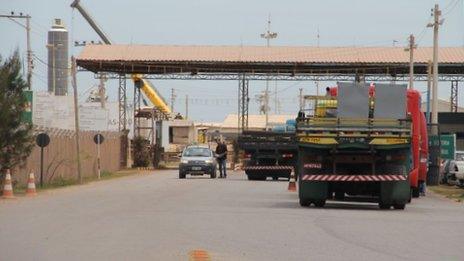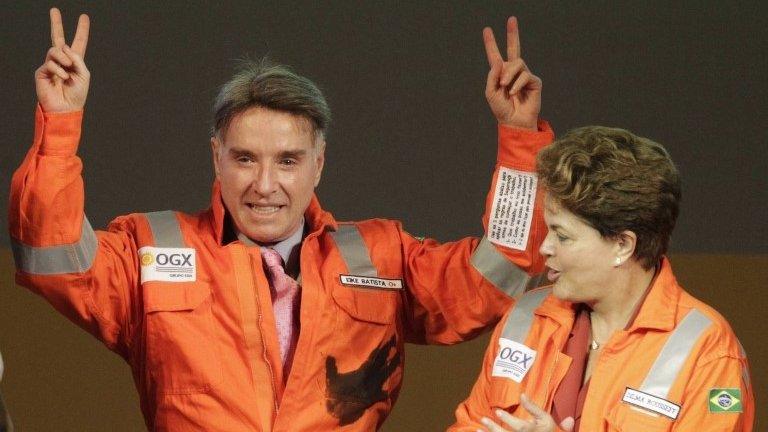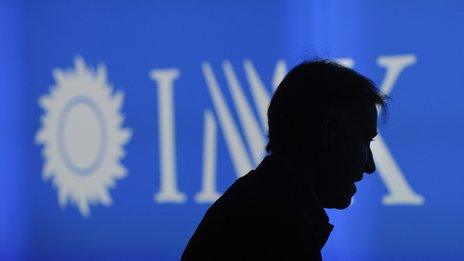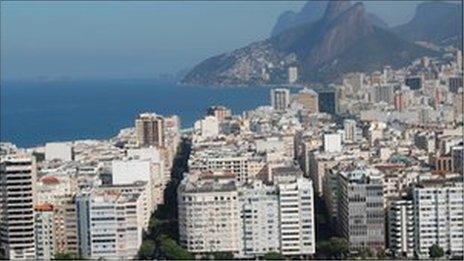Billionaire Eike Batista's dreams crumble
- Published
The BBC's Wyre Davies looks at Eike Batista, the man behind oil firm OGX
Once listed as one of the top 10 wealthiest people in the world, Eike Batista boasted he would one day become the richest person on the planet.
In little over a year, he is thought to have lost almost his entire fortune.
OGX, the huge oil exploration company he controlled, has sought protection from bankruptcy.
It was from a luxurious art deco building in the heart of Rio de Janeiro, overlooking Botafogo Bay and Sugar Loaf mountain, that Batista ran his vast empire.
Now, like the rest of the family silver, it is up for grabs as Batista's dreams crumble.
Batista's rise mirrored that of Brazil itself. His corporate videos showing how, by selling commodities to meet insatiable Chinese demand, he became very wealthy.
"[In 10 years] I think I could be worth about $100bn (£62bn)," said Batista with a shrug of his shoulders during an appearance on American Public television.
"$100bn!" responds the interviewer, almost incredulously.
"Yes, that's right," confirmed the man who, a little more than a year later, would be facing one of the biggest losses in corporate history.
Super port
Making his first millions in mining, Batista wasn't modest about where he wanted himself and Brazil to be.
All ending in the suffix X, representing the multiplication of wealth, his companies had elevated him to super-rich status by 2012.
Through those companies Batista liked to control almost every aspect of his business, not just the mining or the exploration but also infrastructure as well.
He built huge oil tankers, bought trucking companies but the icing on the cake was a massive new super port at Acu, five hours' drive north of Rio de Janeiro.
It was to be a port for Brazil, attracting not just the biggest ships in the world but big multinational companies which would help develop the immediate area around Acu as the most important industrial park in the region.
Today, work at the super port has virtually ground to a halt.

The massive new super port at Acu has already been sold off
Already sold off, like many of Batista's other assets, it's unlikely to be anywhere near as grand or create as many jobs as he had promised.
In the local community, they had convinced themselves Batista and his grand plans would bring unlimited benefits.
"When the port project started, we had huge expectations," says hotel owner Sergio Rangel Soares.
"But the thousands of jobs we thought would be created, simply haven't materialised."
Soares now says he is trying to survive on an unrealistic 30% occupancy rate.
Many other businesses, he said, have already gone under but even if the new American owners at the port manage to resurrect just a fraction of what Batista had promised it would be something.
Bravado and promises
Batista's oil exploration company, OGX, which was to have used this vast Acu facility, has now filed for protection from bankruptcy after being unable to meet a $45m interest payment.
Alarm bells began ringing earlier this year when the company's reserves proved to be hopelessly over-exaggerated and Batista's promises to investors about the validity of the oil fields were way off the mark.
Batista himself has lost more than $30bn, sliding off the Bloomberg index of billionaires. His dream of becoming the world's richest person has evaporated in the space of a few short months.
Prof Marcos Pedlowski, from Rio de Janeiro State University, is a long-term critic of the Batista "model", saying there was little substance to all the talk, bravado and promises.
Feeling somewhat vindicated after years of ridicule from others who though Batista was untouchable, Pedlowski says the Brazilian government should shoulder some of the blame for Batista's excesses - having helped him to expropriate vast areas of land and given him easy access to credit.
"He's partly to blame himself of course," says the professor as we stand on the beach near the eerily quiet Acu port complex.
Trucks come and go but, says Pedlowski, construction work has almost ground to a halt as new investors pick over what remains of Batista's empire.
"Everybody supported the idea that he could not fail. That was the image, not only provided by him but it was supported by the Brazilian government and the Brazilian press," says the professor.
The city of Rio de Janeiro, in particular, might feel the impact of Batista's demise more than most.
Batista was one of the biggest backers of Rio's regeneration ahead of the 2016 Olympics. His downfall may be seen by many as bad news for this city - but he has vowed to bounce back.
- Published31 October 2013

- Published11 July 2013

- Published28 June 2011
